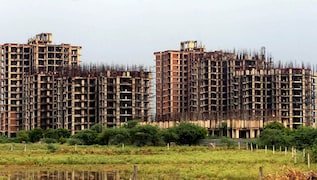
India’s real estate sector is a boost for the country’s economy. PTI
The Indian real estate sector has shown resilience in 2023, and the country eagerly awaits Finance Minister Nirmala Sitharaman’s presentation of the Interim Budget for 2024 on 1 February. The sector’s contribution to the nation’s GDP is expected to double from 6-8 per cent to an estimated 13 per cent by 2025, leading to significant expansion. The industry stakeholders have high expectations from the Budget and are eagerly anticipating strategic initiatives that will serve as catalysts for continued growth. The upcoming Budget is expected to unveil policies that will further strengthen the real estate industry’s upward trajectory and play a pivotal role in shaping India’s economic landscape.
Anticipated highlights of the 2024 Union Budget: What are the key expectations?
- Infrastructure status for affordable housing: One of the most eagerly awaited reforms is the potential grant of infrastructure status to affordable housing. This move is poised to bring about a paradigm shift by making affordable housing projects more attractive to investors. Simultaneously, lower GST rates and a simplified taxation structure for Real Estate Investment Trusts (REITs) are anticipated, which could further stimulate investment in the real estate sector.
- Tax deduction for home loan interest: Industry stakeholders are advocating for a substantial increase in the tax deduction for home loan interest under Section 24 of the Income Tax Act. The proposal to raise the current cap of Rs 2 lakh to at least Rs 5 lakh is viewed as a potential game-changer. This would help to encourage more people to invest in property, as the reduction in taxes not only makes housing properties more financially attractive but also paves the way for a surge in demand for luxurious interior designs, sustainable features, and the integration of electric vehicle (EV) charging points within residences.
- Rural economy focus: The budget is likely to emphasise boosting the rural economy by redirecting savings from subsidies. This strategic move is intended to enhance disposable income among rural households, potentially catalysing growth in real estate beyond urban centres. Higher spending on rural infrastructure and incentivising activities that improve cash flow are among the proposed measures to achieve this objective.
- Interest subvention scheme for urban housing: Anticipation is high for the implementation of the interest subvention scheme for urban housing. This scheme, pending cabinet approval, seeks to provide substantial interest subsidies on housing loans, potentially extending the cap to Rs 50 lakh under the Pradhan Mantri Awas Yojana. With an annual interest subsidy ranging from 3 per cent to 6.5 per cent on loans up to Rs 9 lakh, this initiative could significantly boost the demand for home loans, particularly benefiting lower-income groups and breathing new life into the urban housing market.
In conclusion, the pre-budget analysis reflects a collective expectation for transformative measures in infrastructure development and real estate. The proposed reforms aim to stimulate economic growth and make housing more accessible and affordable for a diverse spectrum of homebuyers with greater interior designs. As the budget unfolds, the real estate sector will keenly watch for these anticipated changes that could shape the industry’s trajectory in the coming FY.
The author is CEO Bonito Designs. Views expressed in the above piece are personal and solely that of the author. They do not necessarily reflect Firstpost’s views.
Read all the Latest News, Trending News, Cricket News, Bollywood News,
India News and Entertainment News here. Follow us on Facebook, Twitter and Instagram.
Join our Whatsapp channel to get the latest global news updates
Published on: January 30, 2024 08:29:13 IST
also read
Budget 2024: What does the common man want?
Finance Minister Nirmala Sitharaman is set to unveil the 2024 Budget on 1 February. Experts say a change in tax slabs, allowing interest to be deducted for housing loans under the new tax regime, and upping the NPS limit are just some of the demands of the common man

